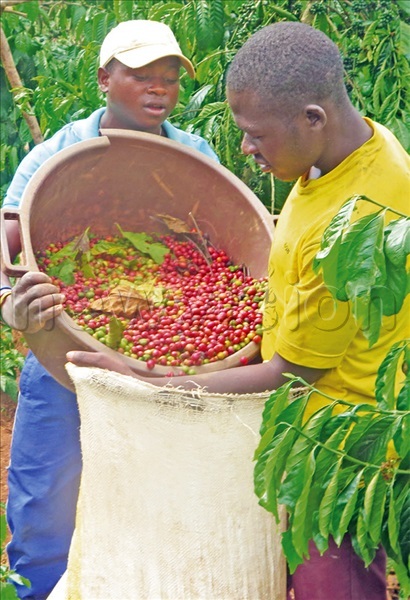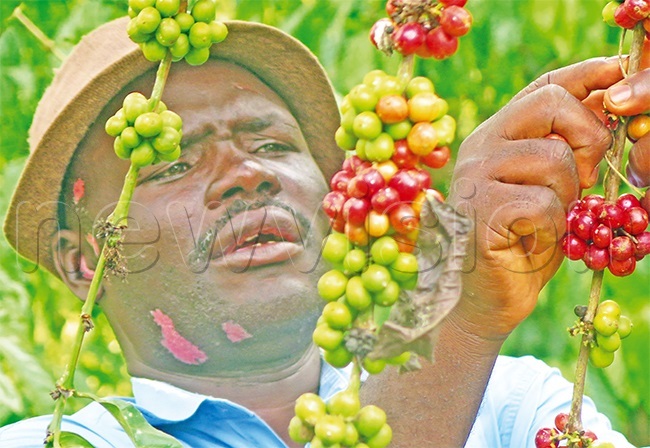Desire to improve produce pushed Monday into farming
“I switched to coffee growing because maize is prone to drought, so we always suffered big losses. I am one of the pioneer coffee growers in Rushango,”
For the seventh year running, Vision Group together with the Embassy of the Netherlands, KLM Airlines, dfcu Bank and Koudjis Animal Nutrition, is running the Best Farmers' competition.
The 2020 competition will run from February to November, with the awards in December. Every week, Vision Group platforms will publish profiles of the farmers. Winners will walk away with sh150m and a fully paid-for trip to the Netherlands.
By Stephen Nuwagira
Monday Atanazio's journey into commercial farming was calculated. The model farmer with an eye on modern farming and value-addition started growing maize in the 1990s. He switched to coffee growing because, according to him, "the crop is not adversely affected by drought".
Currently, the resident of Katikamwe ‘A' village in Rushango town council, Ibanda district, grows coffee, his lead enterprise, as well as bananas and chilli.
The 55-year-old farmer also owns a coffee huller and a groundnuts sheller, as well as close to 100 acres of land. Starting out Monday started growing coffee 15 years ago on half-an-acre, where he planted 150 robusta trees. He bought each seedling at sh300 at the time.
"I switched to coffee growing because maize is prone to drought, so we always suffered big losses. I am one of the pioneer coffee growers in Rushango," he says.

Prior to 2016, when the coffee wilt disease affected the crop, he would earn sh16m per season. However, when part of the plantation, about four acres, was destroyed by the coffee wilt disease, Monday cut it down and instead planted bananas and chillies to diversify income streams.
He says a training by Feed the Future Uganda, through its Commodity Production and Marketing Activity (CPMA), and East African Community secretariat improved his post-harvest handling and also influenced him to venture into value-addition, processing coffee and groundnuts.
"I used to spend a lot of money transporting coffee to Ibanda town (20km away), where prices for the beans were low," Monday says.
Before he started agro-processing almost four years ago, Monday would earn sh10m from coffee per season, excluding costs such as labour, machinery and chemicals. This rose to sh13m when he started selling processed beans.
Maintenance of coffee n Prune each tree at least four times a year. Pruning helps remove excess branches which affect flowering. Only four branches are recommended per big coffee tree.
Spray the coffee regularly to keep away the twig borer. These can either synthetic or organic pesticides. n Mulch the plantation with wild grass, sorghum or maize stalks.
Uproot any diseased plants, heap them in one place and burn them. To control spread of diseases, sanitise the tools used on diseased coffee trees with bleach.
Spray the plantation each season to keep pests and diseases at bay.
Growing bananas
When part of the coffee plantation was affected by the coffee wilt disease over three years ago, Monday cleared it for commercial banana growing. The move surprised many in Rushango, where soils have lost fertility due to overuse.
Undeterred, Monday visited Sembabule district and Kyazanga in Lwengo district to learn from successful banana enterprises in these areas that are prone to drought.
"I learnt a lot from the farmers there. A few months later, I prepared a four-acre garden, where I planted about 950 banana suckers, 300 of which were donated by the government," he says.
Monday sourced the rest of the suckers from Buremba in Kazo district, which cost sh230,000. Monday grows four banana varieties - entaragaza, mbwazirume, kibuzi and mporogoma.
The project activities, including land preparation, labour, manure and buying planting materials cost over sh9m,which he had saved from mainly coffee sales.
Three years down the road, Monday harvested 120 bunches of bananas every fortnight, from about 70 during the initial harvests from the plantation.
A bunch of bananas currently goes for sh5,000 and he earns sh450,000 every two weeks from the banana venture, which is his second-leading enterprise.
Monday, who is the local farmers' association boss, says his goal is to produce best quality bananas with an
eye on value-addition and the export market.
He has encouraged other 12 residents to embrace banana growing.
"During the previous rainy season, I donated 1,000 suckers to farmers and also trained them on the basics of growing and looking after bananas. So, I am confident that within two years, our production will increase and enable us to market the bananas as a cooperative," he adds.

Why bananas Monday says he ventured into banana growing because they are both a cash and food crop. This secures one's financial health, in addition to promoting food security. He adds that the crop is not adversely affected by long dry spells like it is with maize and beans.
Marketing
Currently, Monday sells the bananas to Rwamwanja in Kamwenge, Ishongororo town and Kyengando in Ibanda district. Others are bought by locals. A big bunch of bananas costs sh5,000 to sh25,000.
Maintaining soil fertility
For many residents, Rushango is a barren and arid place that does not support the growing crops such as bananas. So, Monday had to employ new approaches to improve soil fertility in order to have a good yields. Therefore, before planting the banana suckers, Monday bought 42 trips of cow dung and added two of coffee husks from his factory.
"I would first mix the dark soil with the manure (cow dung and coffee husks) and let it to rest for a month before planting. Later, I also dug pits between the banana stools, measuring six by six feet and four feet deep that were refilled with a soil-manure mixture. I got the loam soil and mixed it with cow dung and coffee husks and then put it back in the pits. This provides the plantation enough nutrients to last up to three years," he says.
- Monday is challenged by drought and inadequate water sources. The farmer is going to build an irrigation system to solve the challenge.
- High cost of labour, particularly for those that dig trenches and apply organic manure. Monday says he spends sh2m every time.
- Land fragmentation in Rushango affects farming enterprises like coffee that require big chunks of land.
Post-harvest handling
- Pick only the red coffee beans.
- Dry the beans on polythene for eight days during sunny periods and up to two weeks suring the rainy season to maintain quality and the ‘sweet' aroma of the beans.
- Sort and take for processing when the coffee has attained the recommended 13% moisture content.
Removing broken or diseased beans helps to keep quality and aroma of the coffee.
GOLDEN TIPS
- Select quality planting materials for better results.
- Set targets and work toward achieving them through a welllaid- out plan.
- Always have timely pruning and avoid having dry leaves in the banana plantation
- Always do research to get more knowledge in your line of business.
- Value-addition is the way to go.
- Seek advice from other farmers and experts and avoid doing things on impulse. This will guard you against losses.